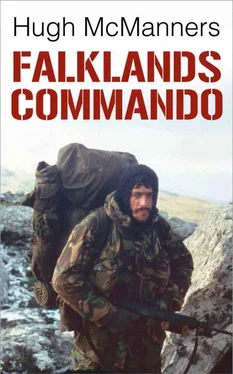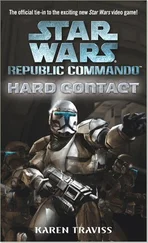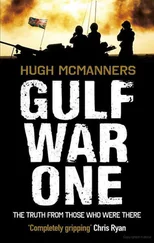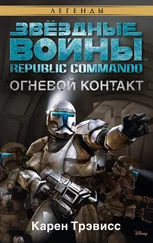Hugh McManners - Falklands Commando
Здесь есть возможность читать онлайн «Hugh McManners - Falklands Commando» весь текст электронной книги совершенно бесплатно (целиком полную версию без сокращений). В некоторых случаях можно слушать аудио, скачать через торрент в формате fb2 и присутствует краткое содержание. Город: London, Год выпуска: 2014, ISBN: 2014, Издательство: Nightstrike Publishing, Жанр: nonf_military, Биографии и Мемуары, на английском языке. Описание произведения, (предисловие) а так же отзывы посетителей доступны на портале библиотеки ЛибКат.
- Название:Falklands Commando
- Автор:
- Издательство:Nightstrike Publishing
- Жанр:
- Год:2014
- Город:London
- ISBN:978-0-992-81540-0
- Рейтинг книги:4 / 5. Голосов: 1
-
Избранное:Добавить в избранное
- Отзывы:
-
Ваша оценка:
- 80
- 1
- 2
- 3
- 4
- 5
Falklands Commando: краткое содержание, описание и аннотация
Предлагаем к чтению аннотацию, описание, краткое содержание или предисловие (зависит от того, что написал сам автор книги «Falklands Commando»). Если вы не нашли необходимую информацию о книге — напишите в комментариях, мы постараемся отыскать её.
Falklands Commando — читать онлайн бесплатно полную книгу (весь текст) целиком
Ниже представлен текст книги, разбитый по страницам. Система сохранения места последней прочитанной страницы, позволяет с удобством читать онлайн бесплатно книгу «Falklands Commando», без необходимости каждый раз заново искать на чём Вы остановились. Поставьте закладку, и сможете в любой момент перейти на страницу, на которой закончили чтение.
Интервал:
Закладка:
But despite this and many other procurement disasters, nothing much has changed. In the large-scale military exercise in Saudi Arabia in autumn 2001, from which Special Forces troops were flown directly into the Taliban war in Afghanistan, many soldiers were not issued with proper desert uniforms and equipment. Their ordinary black combat boots, for example, got so hot that people’s feet were burned.
The problem is one of perception verging on ignorance. The MoD’s army of civil servants is greater in number than Britain’s actual Army and twice the size of the Royal Navy and the RAF. They have their own peculiar perceptions. They inhabit bureaucratic enclaves in places like Bath and Whitehall, with very little contact with real troops, who live scattered across Britain in military towns like Catterick, Aldershot, Colchester and Warminster, on remote airbases in the Fens, or near ports like Plymouth, Rosyth and Portsmouth.
The MoD is one of the highest spending Departments of State. In peacetime, with no operations to reveal its flaws, the MoD’s smooth functioning is the over-riding consideration – a pointless monolith like the ‘Department of Administrative Affairs’ that gave us so many laughs in the television comedy Yes, Minister .
There are no shortcuts here. If we really want a secure, peaceful world, we have to pay for it – not just in time, effort and money, but by using, and sometimes losing, the lives of dedicated men and women brave enough for such a commitment. These unique people: armed forces, secret service, police, fire and ambulance services… must be supported, equipped, paid decently and respected. And when their time of service is over, they must be helped back into normal life – particularly if they have been injured or affected by what they have had to do.
This was not understood before, during or after the Falklands, when a peacetime army went to war. We fought wearing boots that gave us trench foot, water-proofs we had bought with our own money from climbing stores, and heavy, outdated, low-tech radio equipment. And when we got home, there was no attempt to find out whether we had been adversely affected by the experience.
As this book is published, from 1 March 2002, the MoD are to defend themselves in London’s High Court, from being sued by some 1800 veterans of the Falklands, Northern Ireland, Bosnia and Gulf campaigns, all of whom have suffered psychological damage, but were not looked after as they should have been. This case has dragged on for years, with the MoD using every trick in the legal book to avoid addressing the very serious issues involved. The case will be a severe PR disaster for the MoD and the Treasury Solicitors, but nevertheless MoD insiders insist the alternatives as they see them are far worse. It’s all about money. Having been forced to pay out millions to military females forced to leave the Services because of pregnancy, the potential for further MoD payouts are enormous, and the judgment will affect the veterans of other campaigns too.
The MoD has already attempted to subvert the arguments involved in this case by pouring scorn on a supposedly new ‘blame’ culture that they argue has created what they say are unreasonable legal claims. Senior officers have talked in the past of serious combat-related psychological conditions like depression and PTSD as ‘compensationitis’.
But the March 2002 court case is nothing to do with whether or not soldiers should be compensated for being affected by combat. All military people, especially the supposedly litigant Falkland veterans, agree with the opposing MoD defence lawyers that experiencing combat is a reasonable expectation of anybody pursuing a military career. Indeed some of those litigants, plus others like me, would have been disappointed if their military careers had not included a few actual combat operations. At issue is not the adverse psychological effect of combat upon soldiers, which just like the more manifest physical injuries are well understood by the medical profession; but whether the MoD, and more particularly the Army took proper and responsible care of the psychological well-being of its combat soldiers before and after the fighting.
In a book I wrote in 1993, The Scars of War , I describe the way modern soldiers are affected by combat, and how despite the considerable body of medical knowledge in the area of post-combat psychology, many British war veterans are left to cope on their own with severe combat-related mental problems.
The book created an inevitable flurry of knee-jerk outrage from some of the old-school military, highlighted by one very strange, apoplectic (and wildly libellous) six page letter sent on open distribution to many very senior officers within the MoD. But the bombast died away rapidly as people actually read the book, which subsequently appeared on the official reading lists of the Army Staff College and Royal Military Academy Sandhurst.
In particular, The Scars of War described how until the late 1980s and the Gulf War, the British Army’s psychiatrists neglected both the education of troops into the likely psychological affects of combat, and the detection and consequent treatment of psychologically damaged soldiers. I ascribed this to the Army’s overall lack of interest in what they then considered to be ‘sideshow’ conflicts (like the Falklands – “not a proper war” as one senior armoured corps officer told us at Staff College in 1984), which diverted attention from the Cold War and the British Army’s prime role in maintaining an armoured impasse between the NATO and the Warsaw Pact in Central Europe.
In the High Court, the war veterans’ case is that they should have been told what to expect, then been trained to identify symptoms and take basic remedial actions, and received proper psychiatric assessment and treatment afterwards – just as they would expect for physical injuries. If this had been done, the damaging effects of their experiences would have been mitigated, and many affected vets would now be able to function normally. Instead, lives have been ruined; families destroyed; tough, sane people have committed suicide, and many committed career Service men and women have quit when they actually wanted to stay.
This fundamental lack of care cannot be tolerated. In our terrible new, post 11 September world, we have only the people who risk their lives on our behalf to keep us all from the same darkness that engulfed the New York Trade Centre. If we do not insist that our people are properly treated, they will no longer come forward to do this work. And we will all be finished.
Canterbury Kent 2001Introduction to the e-book edition (2014)
Young men fight our wars, while the old men stay at home and do all they can to remove the need for fighting. At least that’s how it’s supposed to be. Today’s most senior politicians have no war experience, and seem at times to behave like the Grand Old Duke of York, deploying the troops with little understanding of what they’re going to have to do. Then when the wars are won, thanking them by making defence cuts of their regiments, ships or squadrons.
I was a young man, so this book is an accurate account of what it was like for me and the other young men I had to privilege to work with. I’m now writing another book, looking back on this extraordinary war, and the aftermath of its demands and experiences on me and many others.
In being a young man’s book, I ought also to add that it’s not enhanced by the thrilleresque structure and prose that characterise more recent military books. Many of my fellow military authors are these days required by agents or commissioning editors to have their writings ghosted or ‘heavily edited’ by a professional writer. This is easy to spot, and I think a shame, as the way professional soldiers express themselves is far more interesting – if only editors had sufficient knowledge of our world to do it the justice it deserves.
Читать дальшеИнтервал:
Закладка:
Похожие книги на «Falklands Commando»
Представляем Вашему вниманию похожие книги на «Falklands Commando» списком для выбора. Мы отобрали схожую по названию и смыслу литературу в надежде предоставить читателям больше вариантов отыскать новые, интересные, ещё непрочитанные произведения.
Обсуждение, отзывы о книге «Falklands Commando» и просто собственные мнения читателей. Оставьте ваши комментарии, напишите, что Вы думаете о произведении, его смысле или главных героях. Укажите что конкретно понравилось, а что нет, и почему Вы так считаете.












